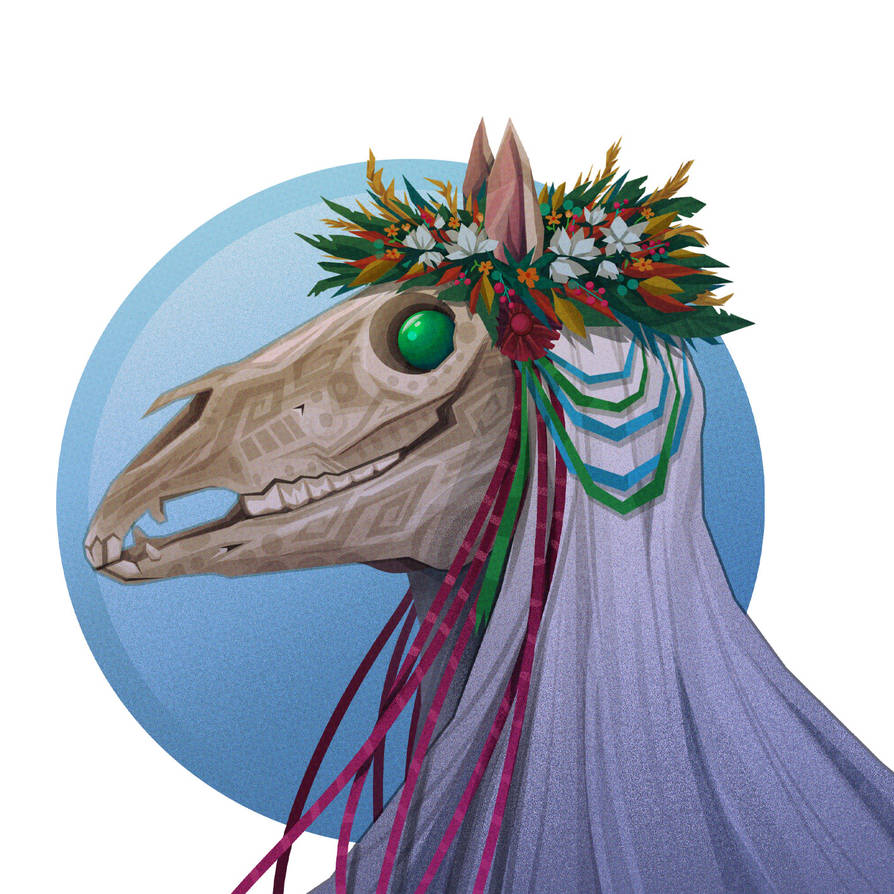If someone were to ask you what your favorite token of Christmas is, you would probably say something like “Christmas trees” or “candy canes,” or some other similarly festive object that people the world over recognize. But for some out there, their answer would be . . . a horse skull.
Welcome to the weird, wacky, and wonderful wassailing world of Mari Lwyd, the world’s strangest Christmas tradition.
Everyone agrees that Mari Lwyd started in southern Wales, although nobody can agree on when. Various periods from the early 1500s to the late 1700s have been thrown around, though it’s probably closer to the former. Some say it developed in the early Middle Ages, in the wake of Christianity’s introduction to the region, while others say it’s the remnants of old pagan rituals that refused to be stamped out by the recently-converted Christians. Regardless, the substance of the tradition has remained largely the same for half a millennium.
It all starts with the titular Mari Lwyd (the Gray Mare) a horse skull fixed to the top of a short, wooden pole. A white sheet is then draped over the skull, effectively hiding the pole (and the person holding it up) and investing the whole prop with a ghostly air. Then, baubles are placed in the eye sockets and the skull is decorated with ribbons, resulting in a bizarre juxtaposition of macabre festivity. Once this is completed, a group of carolers (historically only men, because sexism) make their way around the neighborhood. When a homeowner opens the door to what seems like a slew of innocent people who want to sing a few Christmas carols, one member of the group dons the Mari Lwyd and challenges the head of the house to a duel of rude rhymes known as the pwnco. All whilst under the sheet, the Mari Lwyd-holder sings a short rhyme:
Wel dyma ni’n dwad
Gy-feillion di-niwad
I ofyn am gennad
I ofyn am gennad
I ofyn am gennad i ganu
Translated, this opening stanza (or some variation to similar effect) means:
Well here we come
Innocent friends
To ask leave
To ask leave
To ask leave to sing
After this, the target has to come up with an excuse as to why they couldn’t let the party in, also in rhyme. The two bicker until the Mari Lwyd has shot down all of the excuses put forth, at which time the carolers enter the house and are treated to snacks and a round of ale. During this time, the group sings some actual Christmas carols and has a merry time . . . until the Mari Lwyd decides to cause some havoc and goes on a rampage throughout the house. The leader of the carolers then takes charge of, and ultimately succeeds in, subduing the Mari Lwyd, though not before it has properly terrorized any small children that might be part of the household. Once the carolers are out of songs and have had their fill of the offered food and drink, they pack up and head to the next “victim’s” house.
While this is the basic formula, countless variations of this tradition exist. In earlier times, it was sometimes traditional to simply let the carolers in after the initial rhyme, skipping the pwnco entirely. In many instances, the carolers dress in costumes and supplement their act with Punch-and-Judy-style skits. No matter what variation of Mari Lwyd plays out, people have been dinging fun and merriment in this bizarre caroling method for centuries. (Unless, of course, you’re a small child who’s face-to-face with a horse ghost snapping its jaws at you.)
Though its popularity largely waned over time, the Mari Lwyd experienced a sudden revival in the mid-1900s, and continues to remain a staple in some areas of Wales to this very day, especially Glamorgan and its surrounding areas. This prevalence is not just relegated to the Christmastime caroling, but also extends its influence into the larger sphere of Welsh culture, as well. Numerous poems and art collections feature the spectral horse, firmly establishing it as a hallmark of Welsh tradition and history. Once simply a zany holiday tradition, Mari Lwyd has become an icon of the merriness, craziness, and sometimes-scariness of a Welsh Christmas.
